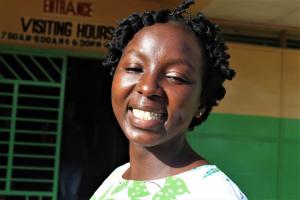In Liberia, better access to cervical cancer screening improving lives of women and girls
Monrovia – Beatrice Banya of Bong County, Liberia, knew that something was wrong. For over two years, the 34-year-old mother of two had been noticing her urination patterns changing. Hospital after hospital failed to provide relief until, finally, a nurse at CB Dunbar Hospital encouraged her to undergo a screening for cervical cancer.
That’s when she discovered that a painless pre-cancerous lesion had been steadily spreading over her cervix.
“I was afraid that my uterus would be removed,” she recalls, now two months into a successful treatment programme. “The cervical cancer screening saved my life.”
In Liberia, an estimated 3550 women died of cervical cancer in 2020. In that same year, around 118 000 new cases were diagnosed, translating to 40.8 diagnoses per 100 000 women.
Screening tests can help detect cervical cancer before any symptoms develop or advance into disease. When cervical cancer or pre-cancerous lesions are detected and treated early, the chances of successful treatment improve.
To improve early detection and treatment of cervical cancer, the Ministry of Health, with support from the World Health Organization (WHO), has established two cervical cancer screening services, one each at two referral hospitals based in Monrovia and Gbarnga cities.
For Florence Kiatamba, Cancer and Palliative Care Coordinator at the Liberia Ministry of Health, the screening services are a much-needed lifeline for many women.
"In the past as a coordinator, I would get endless calls from hospitals indicating that they had suspected cases of precancerous lesions and cervical cancer, but there was little I could do,” she recalls. “People would have to pay around US$ 25–30 for screening at private hospitals, which the average person cannot afford.
“These centres have reduced the financial burden for those in need of the services," she adds.
Gynaecologist Dr Momolu Massaley, Chief of Medical Staff at CB Dunbar Hospital and lead on the Cervical Cancer Project, says that an upgrade in facilities has allowed the hospital to expand beyond its initial mandate of maternity services.
“We now have a thermo-coagulation machine and a computer programme which allows patients to see and better understand their conditions as the screening is being conducted. This wasn’t possible in the past,” he explains.
Dr Massaley and his colleague, Dr Galakpa Johnson, have completed WHO-supported training on cervical cancer screening, which widens availability for this critical service.
“Frankly speaking,” acknowledges Dr Massaley, “[cervical cancer patients] that came to our hospital before this programme were limited to two practical choices: undergo hysterectomy or go home and manage the condition as it advanced.”
So far, 67 patients have been screened for cervical cancer at the CB Dunbar centre. Of these, five patients are currently receiving treatment for pre-cancerous lesions, eight have been diagnosed with cervical cancer, five have undergone hysterectomy, and three have been placed on palliative care.
Immediately following diagnosis, Beatrice was put on a treatment plan. She now encourages others to learn about cervical cancer screening and to come to the hospital for assistance. She hopes that by empowering other women to take control of their health, more cases can be detected earlier, and more lives saved.
“I talk to other women in my community to get checked for cervical cancer at the hospital. The service is free of charge and my life has been changed for the better. I am a testimony,” she says.
“Once a client has been treated successfully, they become ambassadors of the process,” notes Dr Johnson.
The Ministry of Health has been working to raise awareness about the advantages of getting vaccinated, including the prevention of cervical cancer in women of childbearing age. The pilot hospitals now run screening clinics and hold regular health talks about cervical cancer and about the availability of screenings. Plans are under way to further expand community outreach.
The pilot programme is also pivotal in generating data that previously went uncollected, which will be key in improving understanding of the prevalence of the disease.
WHO has supported the programme by providing screening machines, examination beds, consumables, infection prevention and control materials, publicity support and technical capacity-building. The programme is part of the WHO Cervical Cancer Elimination Strategy, which lays the groundwork for countries to act faster.
Dr Musu Duworko, interim head of WHO Liberia, hopes the lessons and results from the Liberia model can be used to expand the services to other parts of the country and beyond including being used as a model for other African countries.
"Cancer screening, early detection, diagnosis, and treatment are all difficult to come by in many African countries, including Liberia,” she says. “Access to cancer care is much more difficult in times of crisis, such as the present COVID-19. Liberia is one of the countries implementing a comprehensive cervical cancer prevention strategy, and we are pleased to contribute to the effort.”



